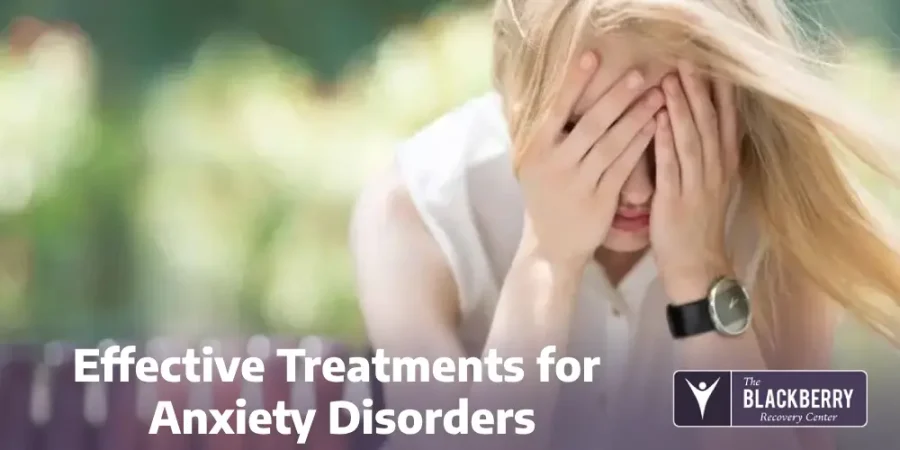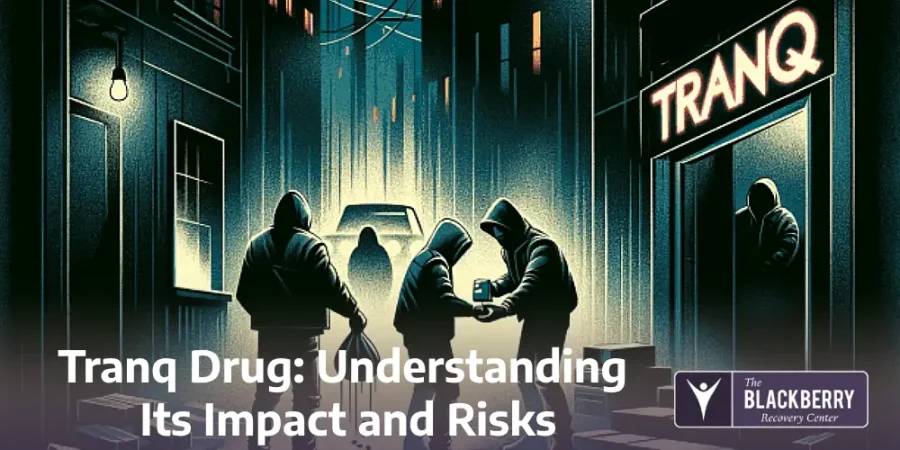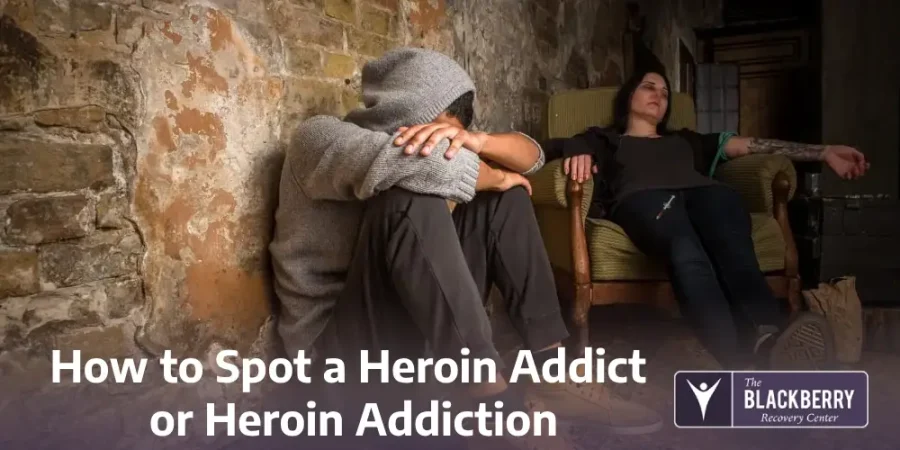Of all the mental illnesses in the United States, anxiety disorders are the most common, affecting over 40 million adults every year. That’s the equivalent of almost one in five people. Such a widespread issue demands ample attention, and thankfully, effective treatments for anxiety are gradually becoming more accessible.
But what are the best treatment options for anxiety, and where can someone find them? Today, we’ll evaluate three common treatments for anxiety and how you can access them at The Blackberry Center.
Symptoms of Anxiety
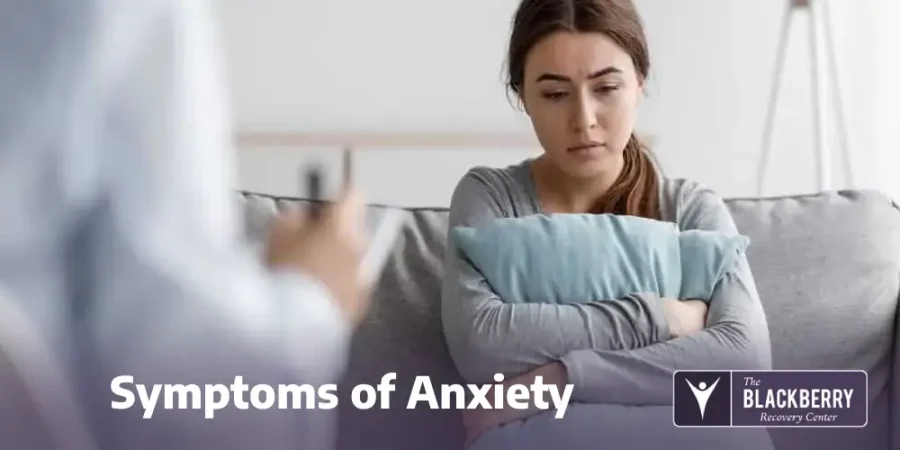
Symptoms of Anxiety
Before discussing the most effective treatments for anxiety, it may be helpful to understand what an anxiety disorder truly is. Many types of anxiety disorders exist, differentiated by factors like severity, symptoms, and what triggers them. However, every anxiety disorder is much more than simply feeling anxious from time to time.
In fact, it is completely normal to feel anxious sometimes. Most people feel nervous before certain events, like an important doctor’s appointment or public speaking. When these feelings persist for weeks or months, though, or interfere with daily life, it becomes abnormal and may indicate an anxiety disorder.
Symptoms of anxiety disorders vary slightly depending on the type of anxiety. That said, many symptoms overlap as well. Those may include:
- Feeling nervous, worried, or tense
- Nausea
- Dizziness
- High blood pressure
- Elevated heart rate
- Anxiety or panic attacks
- Sweating
- Tremors/Shaking
- Trouble concentrating
- Difficulty falling or staying asleep
Effective treatments for anxiety lessen the impact of these symptoms. With the proper resources, anxiety disorders can become manageable even in the most severe cases. Before you can begin that journey, however, it’s important to educate yourself on the types of treatment available.
Identifying Effective Treatments For Anxiety
When you’re looking for effective treatments for anxiety, it’s only a matter of time before you uncover a plethora of potential options. Below are three of the most common methods used to treat anxiety. We’ll explain what to expect from each, how they work, and why they could be the right choice for you.
Lifestyle Changes
Sometimes, when people search for effective treatments for anxiety, they overlook their own power as an individual. It becomes easy to fall into unhealthy patterns of behavior and make choices that worsen anxiety. To counter this, you can learn about the many small changes you can make right now to ease stress.
For instance, simple relaxation techniques make great tools to alleviate symptoms of anxiety. Consider practicing deep breathing exercises, yoga, or meditation. Take time and space for yourself to connect with your emotions and nurture a calm, clear mind.
Dietary changes and physical activity can also help manage anxiety. Good nutrition, including proper hydration, promotes a healthy body and can improve sleep and mood. Other changes like avoiding caffeine and alcohol have shown to decrease symptoms of anxiety as well.
The American Psychiatric Association recommends exercise for anxiety and cites many reasons for this. Just as balanced nutrition benefits everyone, exercise contributes to overall health as well. More than that, however, exercise has also been shown to reduce anxiety by providing an outlet for stress and improving one’s mood.
Understandably, lifestyle changes and relaxation techniques may not completely rid someone of their anxiety. Even so, they are excellent supplemental treatments to use in addition to those discussed below. Do not underestimate your own strength. You may have the power to mitigate the worst of your anxiety symptoms.
Psychotherapy for Anxiety
One of the most effective treatments for anxiety is, of course, talk therapy. With such a broad range of options available, however, it can be daunting to try and determine which would work best for you.
Fortunately, at a facility like The Blackberry Center, you will never be boxed into a single type of therapy. We encourage you to participate in a combination of activities to develop several healthy coping skills.
With that in mind, two common examples of effective treatments for anxiety include cognitive behavioral therapy and group therapy. They act as strong starting points for anyone looking to try psychotherapy for the first time.
In short, cognitive behavioral therapy (CBT) identifies negative thought patterns and actively works to replace them with positive beliefs. CBT revolves around the idea that thoughts, feelings, and behaviors are all linked to each other. It proposes that by altering one, you can control the others. Extensive research shows that anxiety disorders respond well to CBT, with as many as 75% of participants seeing improvements.
Next, a strong support system has a massive impact on someone’s recovery. Partaking in a group therapy session can provide the pillars of support and motivation you may lack elsewhere. Group therapy not only promotes healthy communication, but introduces you to peers who experience similar challenges. That mutual understanding can make it easier to work on coping strategies to help minimize your anxiety symptoms.
Anxiety Medication
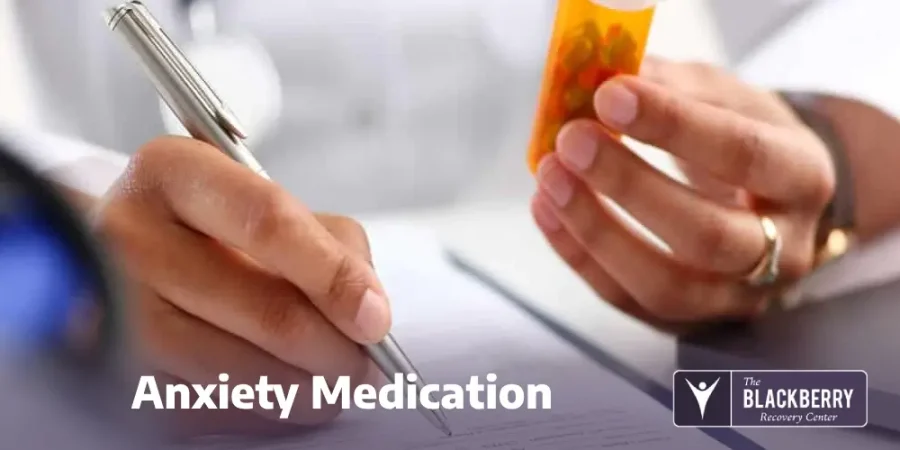
Anxiety Medication
Anxiety disorder in adults can result from a change in someone’s brain chemistry. It has particularly noteworthy ties to the amygdala and hippocampus, which are involved in the body’s ability to process and respond to threats.
In someone with anxiety disorder, these parts of the brain may be overactive and treat small stressors as life-or-death situations. This results in the triggering of intense anxiety even in scenarios that are, in reality, safe and secure.
Because of these fundamental imbalances in the brain, someone may choose to fight chemistry with chemistry. In other words, there are medications that can help correct the brain’s impaired functions. Effective treatments for anxiety need to address the neurobiological impacts of anxiety disorders.
Types of medications associated with reduced anxiety include:
- Selective Serotonin Reuptake Inhibitors (SSRIs)
- Serotonin-Norepinephrine Reuptake Inhibitors (SNRIs)
- Benzodiazepines
- Beta Blockers
SSRIs and SNRIs work to boost levels of serotonin in the brain. Serotonin is a neurotransmitter connected to mood and sleep regulation as well as digestion. It encourages the brain to respond to the appropriate stimuli with happiness or excitement instead of anxiety. These medications may act as long-term remedies that someone takes regularly for several months.
On the other hand, benzodiazepines and beta-blockers offer solutions to intense, short-term anxiety symptoms. For example, benzodiazepines induce relaxation, and beta-blockers ease symptoms like high blood pressure, elevated heart rate, sweating, and tremors. These classes of medication are more effective when taken on an “as needed” basis, as opposed to the daily usage of SSRIs and SNRIs.
Side Effects of Anxiety Medication
Those considering medication for anxiety should also be aware of potential side effects. These vary depending on the type of anxiety medication used. However, some of the most common side effects include:
- Nausea
- Drowsiness
- Headaches
- Weight gain or loss
- Dizziness
- Indigestion
- Blurry vision
- Dry mouth
- Insomnia
Furthermore, although medications serve as very effective treatments for anxiety, it’s important to note that they don’t affect everyone the same way. It may take time to sample various options until someone finds the medication that works best for them.
Treat Anxiety at The Blackberry Center
At The Blackberry Center, we put every patient first. If you struggle with anxiety, depression, substance use, or other mental illnesses, we can help you recover. Our team of licensed doctors and mental health professionals will help you develop an individualized treatment plan. Above all, they ensure your every need is met and direct you toward long-term stability.
All of our programs utilize the modalities discussed above, as well as even more that we did not cover today. The wide variety of treatment options makes it possible for all of our patients to unearth the treatments that work best for them. They’re free to explore and adjust their treatment plans as necessary to maximize their recovery, all while in the safe, comfortable space curated at our peaceful facility.
If you’d like to learn more about the effective treatments for anxiety and depression at The Blackberry Center, we’d love to help you. Please contact us by calling (813) 908-4199 or submitting a confidential contact form online. With the right mindset and guidance, anyone can manage their anxiety and regain control of their daily life.
Video
How to cope with anxiety, Olivia Remes – TED Talk
Imagine there’s someone standing next to you all the time pointing out every! single! thing! you’re doing wrong. This is what millions of anxiety sufferers feel on a daily basis, and it’s awful. Anxiety researcher Olivia Remes lays out a roadmap to getting rid of that “someone.” It begins, she says, with being kinder to ourselves and to others.
3 steps of anxiety overload — and how you can take back control – TED Talk
Anxiety is a normal part of life, so why are we so afraid of it? Psychologist Lisa Damour breaks down how to recognize when anxiety is helpful and when it’s harmful, offering simple solutions for calming yourself and taking back control when you feel it slipping away. (This conversation, hosted by TED science curator David Biello, was part of an exclusive TED Membership event. Visit ted.com/membership to become a TED Member.)
Podcast
The One Anxiety Recovery Skill I Am Doubling Down On
In this episode, Kimberly Quinlan shares the transformative anxiety recovery skill of embracing all emotions and offers practical strategies to help you reduce fear and build emotional resilience.
FAQ
- What are the most common treatments for anxiety disorders?
Treatments include cognitive-behavioral therapy (CBT), medication such as antidepressants or anti-anxiety drugs, and lifestyle changes like mindfulness and stress management techniques. - How does therapy help with anxiety?
Therapy, particularly CBT, helps individuals identify and change negative thought patterns and behaviors that contribute to anxiety. - Are medications effective for anxiety disorders?
Yes, medications can help manage symptoms, often in combination with therapy, under a healthcare provider’s supervision. - Can anxiety disorders be treated without medication?
Yes, many people benefit from therapy, relaxation techniques, and lifestyle modifications alone. - How long does it take to see improvement in anxiety symptoms?
Improvement varies but often takes a few weeks to months with consistent treatment.

